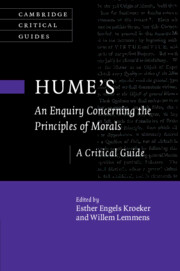Book contents
- Hume’s An Enquiry Concerning the Principles of Morals
- Cambridge Critical Guides
- Hume’s An Enquiry Concerning the Principles of Morals
- Copyright page
- Contents
- Contributors
- Acknowledgments
- Abbreviations
- Introduction
- Chapter 1 The Nature of Morals Founded on the Human Fabric
- Chapter 2 The Pride of Pericles
- Chapter 3 Justice and Politics in the Enquiry Concerning the Principles of Morals
- Chapter 4 History, Context, and the Conventions of Political Society
- Chapter 5 “Why Utility Pleases”
- Chapter 6 Hume on Talents and Moral Virtues
- Chapter 7 Virtues Suspect and Sublime
- Chapter 8 Sympathy and the Sources of Moral Sentiment
- Chapter 9 Virtue and Moral Psychology in the Enquiry Concerning the Principles of Morals
- Chapter 10 Hume, Cicero, and the Ancients
- Chapter 11 Hume on Religion in the Enquiry Concerning the Principles of Morals
- Chapter 12 Moral Disagreement
- Bibliography
- Index
- Cambridge Critical Guides
Chapter 4 - History, Context, and the Conventions of Political Society
Published online by Cambridge University Press: 08 January 2021
- Hume’s An Enquiry Concerning the Principles of Morals
- Cambridge Critical Guides
- Hume’s An Enquiry Concerning the Principles of Morals
- Copyright page
- Contents
- Contributors
- Acknowledgments
- Abbreviations
- Introduction
- Chapter 1 The Nature of Morals Founded on the Human Fabric
- Chapter 2 The Pride of Pericles
- Chapter 3 Justice and Politics in the Enquiry Concerning the Principles of Morals
- Chapter 4 History, Context, and the Conventions of Political Society
- Chapter 5 “Why Utility Pleases”
- Chapter 6 Hume on Talents and Moral Virtues
- Chapter 7 Virtues Suspect and Sublime
- Chapter 8 Sympathy and the Sources of Moral Sentiment
- Chapter 9 Virtue and Moral Psychology in the Enquiry Concerning the Principles of Morals
- Chapter 10 Hume, Cicero, and the Ancients
- Chapter 11 Hume on Religion in the Enquiry Concerning the Principles of Morals
- Chapter 12 Moral Disagreement
- Bibliography
- Index
- Cambridge Critical Guides
Summary
Section 4 of An Enquiry Concerning the Principles of Morals (EPM), “Political Society,” treats a seemingly eclectic collection of subjects. A key to understanding this section lies in Hume’s understanding of the relationship between history, context, and politics. One of the most significant changes he made to his presentation of the political virtues when he recast it for EPM was to drop the conjectural history that had figured prominently in the account he published in the Treatise. This change reflected his deep appreciation of the importance of history and context in the development of conventions of political society and sharpened his critique of social contract theory and republican political thought. On Hume’s account, all of the virtues necessary for life in society are valued for their utility. However, though humans share a universal need for rules to govern their interactions, the specific rules that emerge in particular contexts are rarely objectively necessary. The conventions of political society are not the products of rational calculation but, instead, often arise from historical accidents and develop through a process of habituation. For this reason, the conventions of any particular society, even those that promote universal interests, can only be fully understood contextually.
- Type
- Chapter
- Information
- Hume's An Enquiry Concerning the Principles of MoralsA Critical Guide, pp. 72 - 92Publisher: Cambridge University PressPrint publication year: 2021
- 1
- Cited by



